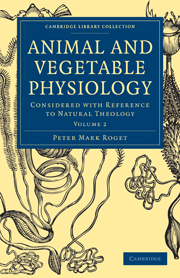Book contents
- Frontmatter
- Contents
- PART II THE VITAL FUNCTIONS
- CHAPTER I OBJECTS OF NUTRITION
- CHAPTER II NUTRITION IN VEGETABLES
- CHAPTER III ANIMAL NUTRITION IN GENERAL
- CHAPTER IV NUTRITION IN THE LOWER ORDERS OF ANIMALS
- CHAPTER V NUTRITION IN THE HIGHER ORDERS OF ANIMALS
- CHAPTER VI PREPARATION OF FOOD
- CHAPTER VII DIGESTION
- CHAPTER VIII CHYLIFICATION
- CHAPTER IX LACTEAL ABSORPTION
- CHAPTER X CIRCULATION
- CHAPTER XI RESPIRATION
- CHAPTER XII SECRETION
- CHAPTER XIII ABSORPTION
- CHAPTER XIV NERVOUS POWER
- PART III THE SENSORIAL FUNCTIONS
- PART IV THE REPRODUCTIVE FUNCTIONS
- INDEX
CHAPTER XII - SECRETION
Published online by Cambridge University Press: 05 October 2010
- Frontmatter
- Contents
- PART II THE VITAL FUNCTIONS
- CHAPTER I OBJECTS OF NUTRITION
- CHAPTER II NUTRITION IN VEGETABLES
- CHAPTER III ANIMAL NUTRITION IN GENERAL
- CHAPTER IV NUTRITION IN THE LOWER ORDERS OF ANIMALS
- CHAPTER V NUTRITION IN THE HIGHER ORDERS OF ANIMALS
- CHAPTER VI PREPARATION OF FOOD
- CHAPTER VII DIGESTION
- CHAPTER VIII CHYLIFICATION
- CHAPTER IX LACTEAL ABSORPTION
- CHAPTER X CIRCULATION
- CHAPTER XI RESPIRATION
- CHAPTER XII SECRETION
- CHAPTER XIII ABSORPTION
- CHAPTER XIV NERVOUS POWER
- PART III THE SENSORIAL FUNCTIONS
- PART IV THE REPRODUCTIVE FUNCTIONS
- INDEX
Summary
The capability of effecting certain chemical changes in the crude materials introduced into the body, is one of the powers which more especially characterize life; but although this power is exercised both by vegetable and by animal organizations, we perceive a marked difference in the results of its operation in these two orders of beings. The food of plants consists, for the most part, of the simpler combinations of elementary bodies, which are elaborated in cellular or vascular textures, and converted into various products. The oak, for example, forms, by the powers of vegetation, out of these elements, not only the green pulpy matter of its leaves, and the light tissue of its pith, but also the densest of its woody fibres. It is from similar materials, again, that the olive prepares its oil, and the cocoa-nut its milk; and the very same elements, in different states of combination, compose, in other instances, at one time the luscious sugar of the cane, at another the narcotic juice of the poppy, or the acrid principle of the euphorbium; and the same plant which furnishes in one part the bland farina of the potatoe, will produce in another the poisonous extract of the nightshade.
- Type
- Chapter
- Information
- Animal and Vegetable PhysiologyConsidered with Reference to Natural Theology, pp. 342 - 351Publisher: Cambridge University PressPrint publication year: 2009First published in: 1834



